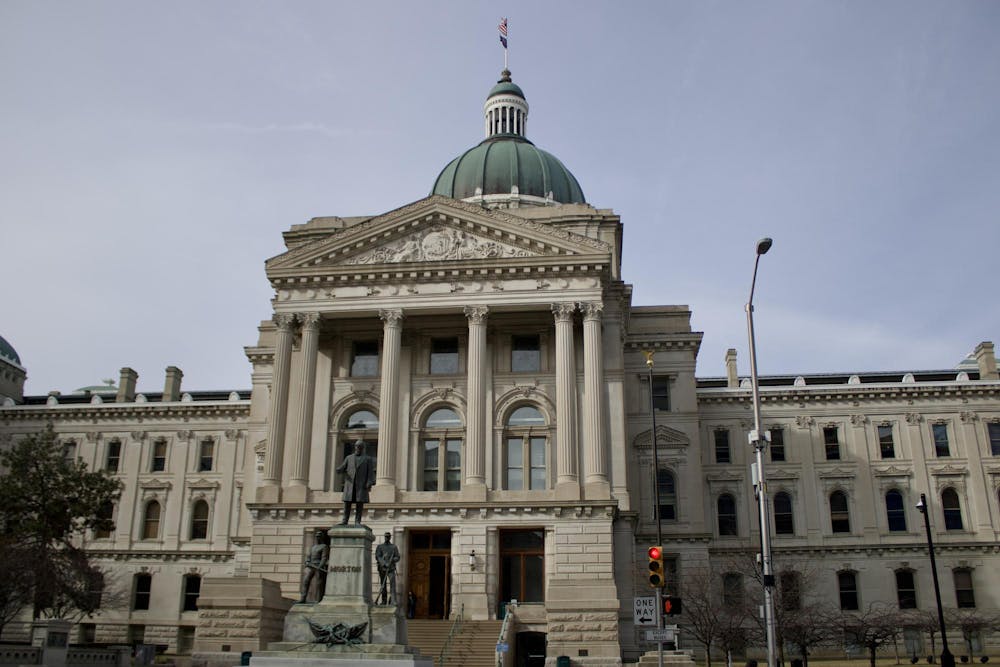Indiana Gov. Eric Holcomb issued his only veto of this legislative session Monday, disagreeing with changes made to priority proposal House Bill 1002, which attempted to define antisemitism. The veto is Holcomb’s eighth of his eight-year stint as governor, which will end in 2025.
House Bill 1002, authored by Rep. Chris Jeter, R-Fishers, attempted to address concerns about antisemitism, particularly on college campuses, amid the Israel-Hamas war. The original version of the bill included the International Holocaust Remembrance Alliance’s working definition of antisemitism and its contemporary examples of antisemitism. These examples include “holding Jews collectively responsible for actions of the state of Israel,” but do not include criticism of Israel “similar to that leveled against any other country.”
The bill garnered support from Jewish activists and advocacy groups, who said having a concrete definition of antisemitism to point toward would help identify and handle it. But the bill proved contentious, with some Muslim advocacy groups and advocacy groups supporting Palestina expressing concerns that the examples of antisemitism included in the IHRA definition would restrict free speech by deeming any criticism of Israel as antisemitic.
Lawmakers removed the IHRA definition while the bill was in the Senate — instead defining antisemitism as “a certain perception of Jews, which may be expressed as hatred toward Jews” — but ultimately reinstated it after Jewish organizations reversed their support for the bill.
The final version of the bill, which Holcomb vetoed, included the IHRA definition but left out the specific examples of antisemitism such as not holding Jewish people collectively responsible for actions of the state of Israel. In a statement to media and lawmakers, Holcomb said he ultimately opposed the bill because of the exclusion of those examples and what he said was vague language.
“While I applaud the General Assembly’s effort to address and define antisemitism, I cannot agree with the outcome therefore I vetoed HEA 1002,” he said in the statement. “The language that emerged in the final days of the legislative session fails to incorporate the entire International Holocaust Remembrance Alliance (IHRA) definition and its important contemporary examples. Additionally, the confusing language included in the bill could be read to exclude those examples therefore I must veto HEA 1002.”
The governor did on Monday issue a signed proclamation condemning all forms of antisemitism and supporting the IHRA definition and examples.
The Indianapolis Jewish Community Relations Council praised Holcomb’s decision to veto, releasing a statement thanking the General Assembly for their work to address antisemitism.
“JCRC will work diligently with members of the Indiana General Assembly, executive agencies, statewide educational institutions, and statewide educational organizations to ensure the guidance of Governor Holcomb’s proclamation is correctly applied to identify and confront antisemitism and meet the needs of Jewish students in K-12 and higher educational settings,” the statement reads.
The Indiana Muslim Advocacy Network expressed disappointment regarding the decision to veto the bill, saying the action set back efforts to achieve a balanced agreement about the bill.
“From the beginning, we have made it clear that the examples referenced by the IHRA definition could be used to stifle freedom of speech in schools and on college campuses by labeling the criticism of Israel as antisemitic,” the statement read. “Governor Holcomb’s proclamation disregards our meritorious concerns. While a proclamation is not legally binding, we will continue to monitor free speech concerns across the state to prevent any misinterpretation or encroachment on constitutional rights. As religious minorities, we understand the impact of hate and stand in unwavering solidarity with the Jewish community in combating antisemitism. We will persist in our endeavors to safeguard free expression in educational institutions across Indiana and ensure the protection of our Muslim students.”




